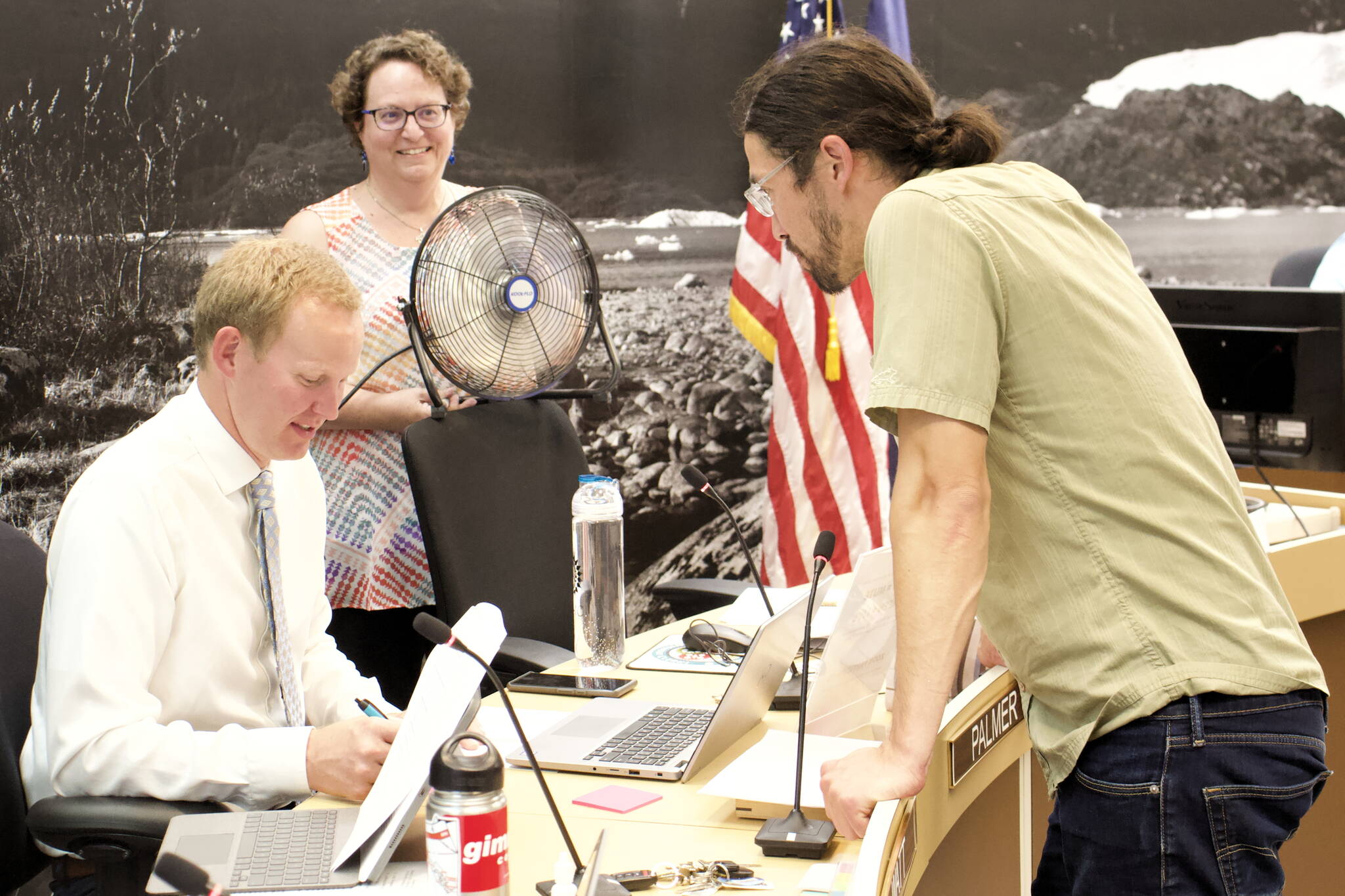A draft “shopping list” of 18 items costing about $60 million that local residents would approve by extending the city’s temporary 1% sales tax for five more years was compiled by City and Borough of Juneau Assembly members Monday.
Topping the list are $9.9 million for building maintenance projects, $4.15 million for the Affordable Housing Fund, $2.5 million for child care assistance, and $5 million for major parks and recreation maintenance/repairs.
Other big-ticket items include $5 million for additional State Office Building parking, $5 million for school district facilities, $6.5 million for harbor projects, and $4 million to widen and install a turnaround on Gastineau Avenue.
A final list must be drafted by July 11 in order for an ordinance to be approved at the Assembly’s Aug. 1 meeting that puts the extension on the Oct. 4 municipal ballot. Voters have been asked to renew the tax, an add-on to the permanent 4% sales tax, and a list of projects generally at five-year intervals since the early 1990s.
Assembly members spent nearly three hours during a Committee of the Whole meeting evaluating an initial priority list of 27 items totalling about $113 million, or more than twice as much as the temporary sales tax is expected to generate. As such, Mayor Beth Weldon spent much of the evening proposing reducing or eliminating funds for items on the priority-ranked list, leading efforts to include as many items as available revenue will allow.
“As in the past I prefer capital projects, deferred maintenance, big things that can’t be funded in different ways,” she said.
For instance, Weldon proposed reducing the top-priority building maintenance allocation to $8 million instead of $9.9 million. It was rejected by a 5-4 vote, as was a “compromise” by Assembly member Wade Byrson to allocate $9 million by a 7-2 vote.
Weldon also encountered fervent opposition for proposing $3 million for affordable housing be eliminated, while acknowledging it’s a sensitive topic and worthy cause. But the list of priority projects notes $5 million is already allocated for that purpose in the current fiscal year, and the work is for unspecified projects that aren’t upgrades or maintenance.
Assembly member Maria Gladziszewski argued “affordable housing is our No, 1 priority — the purpose of (the funding) is to be there when good projects come.” Alicia Hughes-Skandijs was among the six other committee members voting Weldon‘s proposal down, stating it’s a priority needing attention before the situation worsens.
“We talk about things being a dire emergency,” she said. “This could make it more of a dire emergency.”
Later during the evening the committee would by a 5-4 vote revise the line item and add $1.15 million more for a total of $4.15 million, making it one of only two items to get more funding than originally listed (the other was energy efficiency projects, getting the slightest of increases to $1.6 million instead of $1.5 million).
Weldon was successful, however, in reducing the amount for major parks and recreation repairs/upgrades to $5 million from the original $8.75 million was approved by the committee. She noted a pending ballot bond may add $1.6 million in such funds, making up some of the difference.
“The reason I chose $5 million is an arbitrary number,” she said. “We just can’t fund everything.”
Gladziszewski was among those opposed, stating “this is exactly the kind of projects people want,” but the reduced funding was approved by a 6-3 vote.
Child care funding was cut in half from the originally proposed $5 million allocation, with Weldon again noting alternative funding to cover part of the reduced amount exists. As with affordable housing it was among the most contentious items of debate.
“I think behind housing this is the most important issue we need to address,” Assembly member Carole Triem said.
A vote for the full $5 million in child care failed by a 4-5 vote, with vote immediately after for the reduced $2.5 million being approved 8-1, with ‘Wáahlaal Gíidaak Barbara Blake opposed.
Also cut in half was funding for a downtown Waterfront Museum, receiving $2 million rather than $4 million. Weldon again noted other sources of funding are available and other Assembly members noted the project is still in the conceptual stage. Some members added that the project is a new building, rather than maintenance, and it has largely fallen off the public radar since it was originally proposed years ago due to the COVID-19 pandemic.
A major reduction for another project in the early stages was a proposed $6.5 million for a Lemon Creek multi-model path, which was trimmed to $1.5 million by a 6-3 vote. Weldon said she wasn’t willing to fund the full amount at this project’s early stage, but the reduced amount allows it “get the project off and running.”
The biggest cuts of all were eliminating $15 million for wastewater utility projects and $10 million for water utilities projects. But the projects were ranked 17th and 19th on the priority list, respectively, and only a few million remained in the expected revenue pool from the tax by the time they were considered.
Among the items at the bottom of the list failing to get consideration were $2.5 million for electrification of city facilities, $5 million for baseball/softball turf at Adair Kennedy Track and about $1 million for a Thane Community Garden grant.
Juneau Empire reporter Mark Sabbatini can be reached at mark.sabbatini@juneauempire.com

